
The New World Order was an American professional wrestling group that originally consisted of "Hollywood" Hulk Hogan, Scott Hall, and Kevin Nash.
Keiko Aoki is a Japanese retired professional wrestler and professional golfer better known as Bull Nakano. She began competing in All Japan Women's Pro-Wrestling (AJW) as a teenager under the ring name Bull Nakano. As a wrestler she was a villain, who often teamed with her mentor Dump Matsumoto. In Japan, she held several of AJW's singles and tag team championships. After being phased out by the company in the early 1990s, she traveled to North America, where she first competed in Mexico's Consejo Mundial de Lucha Libre (CMLL), becoming its first World Women's Champion. In 1994, she made her way to the World Wrestling Federation (WWF), where she had feuded with Alundra Blayze over the WWF Women's Championship. After holding the title once, she also competed in World Championship Wrestling (WCW). In 1998, Nakano began competing as a professional golfer, and in 2006, she joined a tour with the Ladies Professional Golf Association (LPGA).
Ernest Clifford Miller is an American actor and former professional wrestler who worked for World Championship Wrestling (WCW) and World Wrestling Entertainment (WWE) better known by his ring name, Ernest "The Cat" Miller. As an actor, he is perhaps best known for his role in the 2008 drama The Wrestler.

Debrah Ann Miceli, better known as Madusa, is an American monster truck driver and former professional wrestler. She is currently working for National Wrestling Alliance (NWA) as a producer. In professional wrestling Miceli is also known by the ring name Alundra Blayze, which she used while in the WWF/WWE. Outside of the WWF, she wrestled under her professional name of Madusa, which was shortened from "Made in the USA". Her early career was spent in the American Wrestling Association, where she once held the AWA World Women's Championship. In 1988, she was the first woman to be awarded Pro Wrestling Illustrated's Rookie of the Year. The following year, she signed a contract with All Japan Women's Pro-Wrestling, making her the first foreign wrestler to do so.
Michael Laauli Hayner is an American semi-retired professional wrestler. He is best known for his appearances with World Championship Wrestling from 1995 to 2000 under the ring name Prince Iaukea and later The Artist Formerly Known as Prince Iaukea or simply The Artist. He also appeared on Season 5 of Love is Blind.
Evan Karagias is an American retired professional wrestler and actor.

Hisako Sasaki is a Japanese retired professional wrestler better known as Akira Hokuto.
The World Championship Wrestling (WCW) Women's Heavyweight Championship was a title for the women's professional wrestling division in World Championship Wrestling. It lasted from 1996 until 1998, when it was abandoned. It is not to be confused with prior women's titles recognized by the promotion.
William Brenneman is an American retired professional wrestler and mixed martial artist, better known by his ring name Jerry Flynn. Flynn is best known for his appearances with World Championship Wrestling between 1996 and 2000. He is also known for his appearances in Japan with puroresu promotions including Pro Wrestling Fujiwara Gumi and New Japan Pro-Wrestling.

Collision in Korea, officially known as the Pyongyang International Sports and Culture Festival for Peace, was a professional wrestling pay-per-view (PPV) event jointly produced by New Japan Pro-Wrestling (NJPW) and World Championship Wrestling (WCW). The event featured 15 matches over two evenings on April 28 and 29, 1995, at May Day Stadium in Pyongyang, North Korea. It aired in North America on August 4, 1995, when WCW broadcast a selection of eight matches from the show on pay-per-view. It was the first event hosted by an American professional wrestling promotion in the country.

World Championship Wrestling (WCW) was an American professional wrestling promotion that existed from 1988 to 2001. It began as a promotion affiliated with the National Wrestling Alliance (NWA) that appeared on the national scene under the ownership of media mogul Ted Turner and based in Atlanta, Georgia. Prior to the launch of WCW as a separate promotion, the "World Championship Wrestling" name was used for a television program produced by NWA promotions Georgia Championship Wrestling and Jim Crockett Promotions on TBS; the name came from an Australian wrestling promotion of the 1970s.
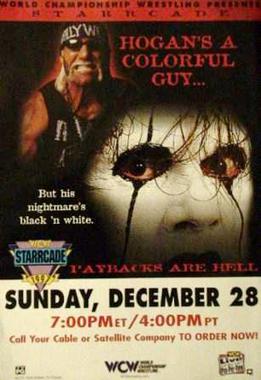
The 1997 Starrcade was the 15th annual Starrcade professional wrestling pay-per-view (PPV) event produced by World Championship Wrestling (WCW). It was held on December 28, 1997, at the MCI Center in Washington, D.C.
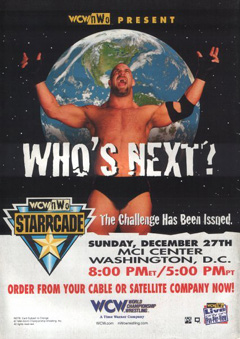
The 1998 Starrcade was the 16th annual Starrcade professional wrestling pay-per-view (PPV) event produced by World Championship Wrestling (WCW). It took place on December 27, 1998, from the MCI Center in Washington, D.C.
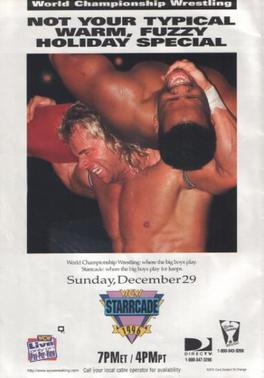
The 1996 Starrcade was the 14th annual Starrcade professional wrestling pay-per-view (PPV) event produced by World Championship Wrestling (WCW). It took place on December 29, 1996, from the Nashville Municipal Auditorium in Nashville, Tennessee. The event featured the New World Order (nWo) stable, which formed in July.

Wrestling World 1997 was a professional wrestling event co-produced by the New Japan Pro-Wrestling (NJPW) and Big Japan Pro Wrestling (BJW) promotions. It took place on January 4, 1997 in the Tokyo Dome. Officially, the show drew 62,500 spectators and $5,000,000 in ticket sales. The show featured 12 matches, including four matches that were promoted jointly with the BJW promotion and presented as a rivalry between the two promotions. The show featured 12 matches in total, including three title matches, two of which saw new champions crowned.
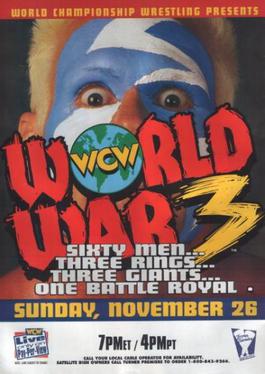
The 1995 World War 3 was the inaugural World War 3 professional wrestling pay-per-view (PPV) event produced by World Championship Wrestling (WCW). The event took place on November 26, 1995, from the Norfolk Scope in Norfolk, Virginia.

The 1996 World War 3 was the second World War 3 professional wrestling pay-per-view (PPV) event produced by World Championship Wrestling (WCW). The event took place on November 24, 1996, from the Norfolk Scope in Norfolk, Virginia. Similar to the Royal Rumble format, this event marked for the first time that the winner of the World War 3 battle royal would receive a future title shot at the WCW World Heavyweight Championship.

The 1997 World War 3 was the third World War 3 professional wrestling pay-per-view (PPV) event produced by World Championship Wrestling (WCW). The event took place on November 23, 1997 from The Palace of Auburn Hills in Auburn Hills, Michigan.

The 1997 Great American Bash was the seventh Great American Bash professional wrestling pay-per-view event produced by World Championship Wrestling (WCW), and 11th Great American Bash event overall. It took place on June 15, 1997, at The MARK of the Quad Cities in Moline, Illinois.
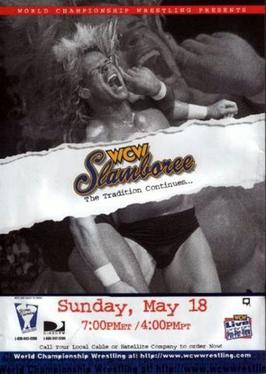
The 1997 Slamboree was the fifth Slamboree professional wrestling pay-per-view (PPV) event produced by World Championship Wrestling (WCW). It took place on May 18, 1997 from the Independence Arena in Charlotte, North Carolina. As of 2014 the event is available on the WWE Network.













